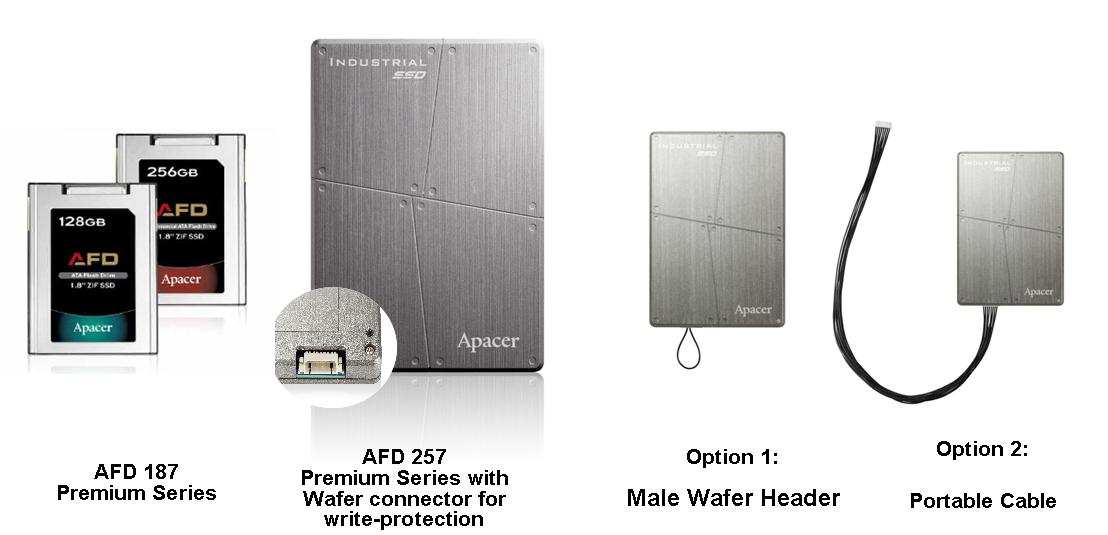Apacer Introduces Lineup of PATA SSDs
For those still using an IDE / PATA interface, Apacer's new range of SSDs may offer a viable upgrade.
Though most modern consumer computers have moved onto the SATA interface, many industrial and enterprise computers still use the relatively inefficient and slower IDE / PATA interface. Apacer has clearly targeted this market with its new lineup of "value added" PATA Solid State Drives which aim to offer a viable upgrade option to consumers. These drives offer a maximum capacity of 256 GB and feature a variety of security and transmission enhancements such as PIO Mode-4, MWDMA Mode-2, Ultra DMA-6, 72-bit ECC function, wear-leveling technology, and the S.M.A.R.T. self-monitoring analysis reporting technology.
The SSDs also come with Apacer's three tier data protection options, namely "Full Erase", "Destroy" and "Write Protection". The former ensures effective and complete erasure of data stored in the User Block and Free Block to prevent data theft, Destroy is an "advanced cleaning technology" that clears data from the storage and system blocks and meets the requirements of "national defense-class surveillance facilities. Finally, Write Protection offers data protection and is based on the concept of virtualization of the write-in process, which allows the user to choose from executing the write-in command or store the data in a temporary space. Under the temporary mode, the data is not written into the flash; instead it is stored independently from the operating system. Therefore, when abnormal activities are discovered in the system, one simple reboot will make the temporary virtual data disappear completely and effectively.
Apacer's lineup of SSDs are available in two configurations, the 2.5" 44 pin AFD 257 and the 1.8" 40 pin AFD 187 and offers a storage capacity of up to 256 GB.
Contact Us for News Tips, Corrections and Feedback
Get Tom's Hardware's best news and in-depth reviews, straight to your inbox.
Tarun Iyer was a contributor for Tom's Hardware who wrote news covering a wide range of technology topics, including processors, graphics cards, cooling systems, and computer peripherals. He also covered tech trends such as the development of adaptive all-in-one PCs.
-
danwat1234 MWDMA?? ;;Reply
ATA/ATAPI - version numbers of ATA/ATAPI standards supported by your HDD. Most modern HDD supports 4 version of standard.
Maximum PIO supported mode - PIO is the faster mode of transfer operation when default, but it uses the CPU for transferring data. Maximum mode always supports lower modes - for example, if your HDD supports PIO mode 4 - it also supports PIO 3, PIO 2-1
Maximum Multi Word DMA (MWDMA) mode - multi word DMA mode is the mode of transfer operations that use DMA - so it doesn't use the CPU while transferring data - so you can do make anything else while your HDD is working. MWDMA mode-2 = 16.6MB/s
Ultra DMA mode - new mode supported mostly in Pentium and other high-end systems. In this mode it also keeps the CPU free while the system transfers data, but it can work faster than MWDMA mode. -
Thunderfox PATA is limited to 133 MB/s. There are mechanical drives which are faster than this. The only benefit of a PATA SSD would be the lack of seek latency, but it still seems like a very niche market.Reply -
bgunner Due to the slow transfer speeds of IDE it doesn"t seem to be cost effective even for a business to spend this kind of cash on.Reply -
ipwn3r456 I don't think it's a good idea to introduce this, if anyone still owns a computer with PATA connectivity, the hardwares itself aren't good enough for modern applications. Even with a PATA SSD, it won't improve as much. Better off buying a new computer.Reply -
ianj14 I still use a laptop from 2006 with a PATA interface, running Win7 respectably. It could benefit from better seek times though. No prices are in the article, but given the specs of the drives, it wouldn't surprise me if they were more expensive than simply buying a new laptop with a SATA interface. So I suspect these drives are aimed at enterprise-level use where for whatever reason, upgrading isn't a viable option.Reply -
dark_knight33 ThunderfoxPATA is limited to 133 MB/s. There are mechanical drives which are faster than this. The only benefit of a PATA SSD would be the lack of seek latency, but it still seems like a very niche market.Reply
The benefit you'd get from SSD on PATA is primarily in the enormous Random IOPS, and not usually in max seq R/W speed. You'd still see incredibly reduced boot times, and significantly lower power usage.
As to the cost, if it were any more than a small PATA/SATA conversion board & a SATA SSD, I'd have to take a hard look at benchmarks to justify the added amount. -
Soda-88 PC without SATA controller shouldn't be bottlenecked by (newer) mechanical HDD in the first place.Reply -
Geekster99 Seems traditional 2.5-inch PATA drives are close to extinction - NewEgg and ProVantage each only carry one, the 80GB 5400RPM WD800BEVE. So if these new drives offer additional options.Reply -
Usersname Would be nice to know prices and availability as these may well fit the iPod Classic. I'd be very keen to try one out if the price is right.Reply -
randomstar I think the best market for these is industrial settings where reliability, and the ability to keep a piece of equipment running that may be expensive to replace, and survivability in harsh enviroments are important.Reply
I know many plants that have very expensive process controllers where the manages are stressing every day about the possability of drive failure taking the plant out of service - this would fix that.
